May 14, 2025 | 11:21 GMT +7
May 14, 2025 | 11:21 GMT +7
Hotline: 0913.378.918
May 14, 2025 | 11:21 GMT +7
Hotline: 0913.378.918
Can Tho City's Department of Agriculture and Rural Development has introduced various VietGAP-compliant or organic durian production models over the last few years. Accordingly, they emphasize the safe and effective use of pesticides on durian trees in key durian production areas such as Phong Dien, Thoi Lai, and O Mon.
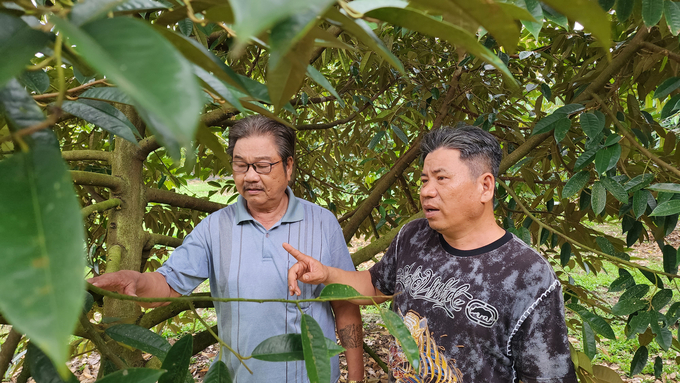
Can Tho City has implemented numerous safe and sustainable durian production models. Photo: Kim Anh.
Results from the organic and VietGAP-compliant production models indicate that durian trees exhibit superior growth in foliage, flowers, and fruit set rates due to the use of organic fertilizers. Additionally, the models reported a 50% drop in pesticide usage compared to previous cultivation practices and a 30% increase in biological pesticide usage.
Tran Thi Kim Thuy, Deputy Director of the Can Tho City's Sub-Department of Crop Production and Plant Protection, noted that these models have yielded highly promising economic results.
Notably, the production models have reduced production costs by 12.4 million VND per hectare by lowering pesticide and fertilizer expenses. On the other hand, the model farms earned approximately 28.6 million VND per kilogram of durian in revenue. As a result, farmers earn an average profit of 200 to 300 million VND per hectare.
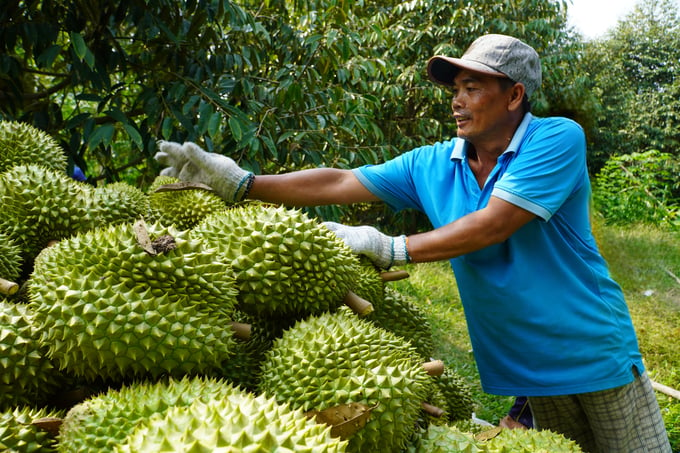
Can Tho City has established 66 durian-growing areas spanning nearly 1,500 hectares with the aim of exporting to the Chinese market. Photo: Kim Anh.
From an environmental perspective, the use of biologically derived organic pesticides and fertilizers has improved soil fertility and mitigated degradation, particularly in aged fruit-growing regions.
Notably, durian trees have exhibited enhanced disease resistance, thereby enabling safer production practices that protect the environment. Consequently, this advantage, which complements the city’s agricultural and rural development strategy, forms a foundation for the sustainable development of Can Tho’s durian industry.
Deputy Director Thuy reported that Can Tho City currently houses nearly 5,000 hectares of durian trees, over 3,000 of which have reached the fruit-bearing stage. She emphasized that farmers who employ organic fertilizers can reduce the use of nitrogen fertilizers by approximately 279 tons per year. This cost-saving measure helps maintain stable yields and create high-quality products with greater export value, thereby enhancing production efficiency.
Moving forward, Can Tho’s agricultural sector aims to eliminate unregulated durian cultivation activities, focusing on areas with unsuitable climate, soil, or irrigation conditions.
Moreover, the city will also focus on maintaining and improving natural soil fertility to strengthen and stabilize soil structure, prevent erosion, and support nutrient absorption through a healthy soil ecosystem.
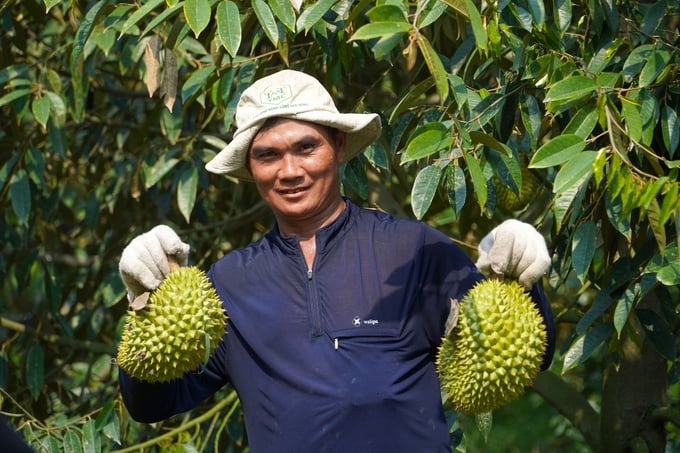
The development strategy for Can Tho’s durian industry emphasizes soil protection, product quality improvement, and compliance with import market standards. Photo: Kim Anh.
Several measures to maintain durian tree health include: selecting pest-resistant plant varieties, performing crop rotation, adopting appropriate mechanical and physical methods, and protecting natural predators of harmful organisms.
In addition, the city will provide technical support in standardized production as well as the safe and effective use of pesticides. Farmers, cooperatives, and exporters will also receive training on phytosanitary and food safety regulations imposed by importing countries. This includes guidance on registering geographical indications and building the Can Tho durian brand in key markets such as China, South Korea, and Japan.
Can Tho City currently accomodates 213 crop production areas totaling nearly 2,900 hectares, with several key crops including mango, star apple, longan, and durian. Among this group, durian is cultivated in 66 areas covering nearly 1,500 hectares, with the aim of exporting to the Chinese market.
The city currently accommodates 17 registered packaging facilities, which belong to nine companies. It offers the city a key advantage in purchasing fruits that failed to meet fresh export standards.
With the goal of enhancing quality control for durian exports from the input stage, Can Tho City's Department of Agriculture and Rural Development has strengthened the inspection and monitoring of its production areas. Consequently, it aims to identify and promptly address violations or misuse of production unit or packaging codes for export. The Department also performs regular inspections of packaging facilities to ensure that fresh and frozen durians meet export quality requirements.
The total durian production acreage in Can Tho City has seen a significant increase in recent years. The city facilitated 537 hectares of durian cultivation land in 2015. This figure has expanded to 5,000 hectares in 2024, with approximately 3,000 hectares currently in the fruit-bearing stage. Notably, the Ri6 durian variety dominates production, accounting for 86% of the total area.
Translated by Nguyen Hai Long

(VAN) Use of high-quality broodstock and biotechnology is regarded as the most effective approach to ensuring sustainable and economically viable shrimp aquaculture ahead of climate change and the emergence of increasingly intricate disease patterns.

(VAN) Carbon farming is a form of agricultural practices that helps absorb more greenhouse gases than it emits, through smart management of soil, crops, and livestock.

(VAN) This is a key content of the Memorandum of Understanding recently signed between the Vietnam Fisheries Society and Kunihiro Inc of Japan.

(VAN) To achieve the goal, local authorities and businesses in Kon Tum province have fully prepared the necessary conditions for the new Ngoc Linh ginseng planting season.
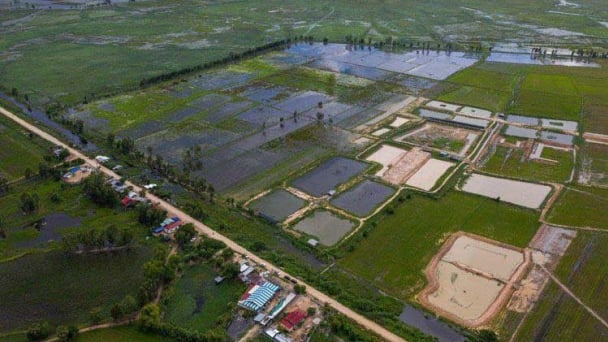
(VAN) Jiangsu province is gearing up to host training programs in Phnom Penh, the capital of Cambodia, this year to establish the Fish and Rice Corridor.
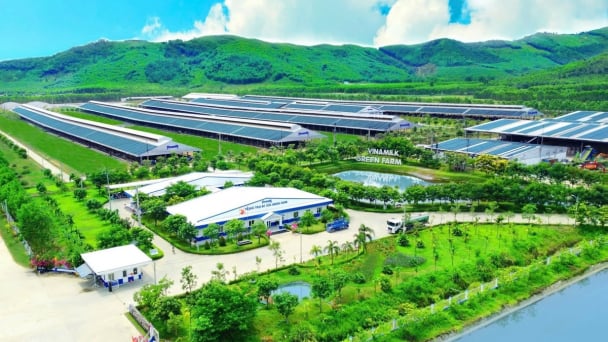
(VAN) Le Hoang Minh, representing Vinamilk, shared the company's experience in energy saving and green energy transition for production at a workshop held during the P4G Summit.
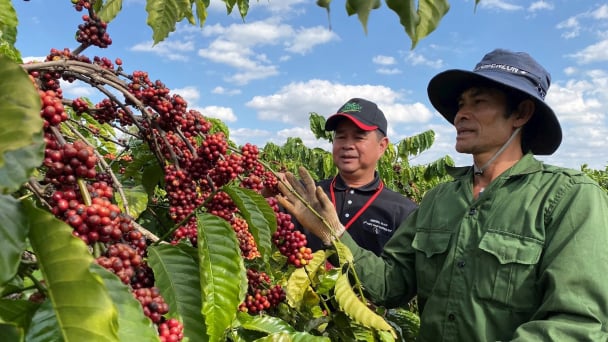
(VAN) Businesses emphasize fairness and equality when integrating social factors into their sustainable development strategies.